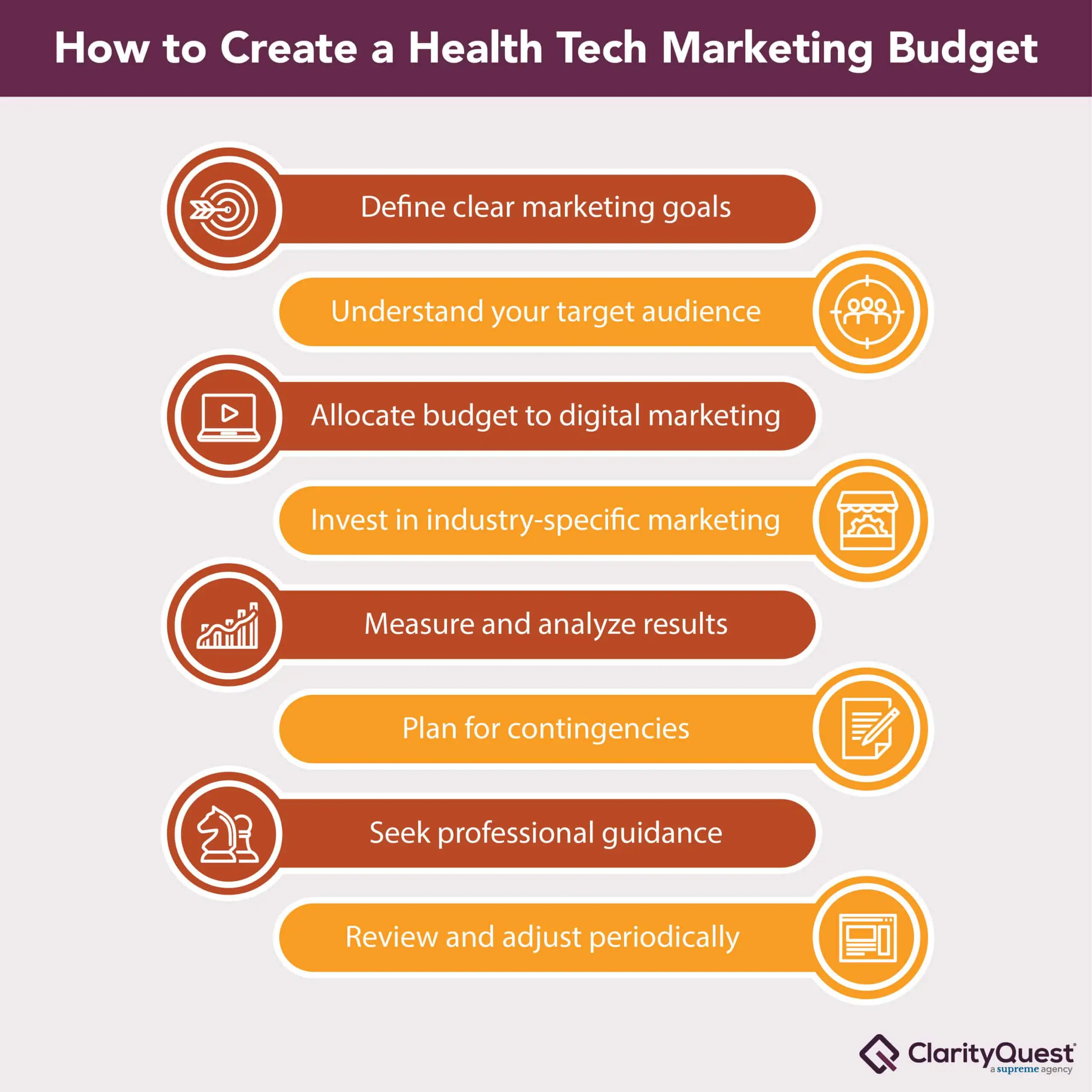Health tech companies face a unique and dynamic set of challenges when it comes to marketing, but certain marketing budget allocation best practices are tried and true.
To succeed in this highly competitive industry, your marketing budget must align with your business objectives and help you reach your target audience effectively.
Here are the key steps and considerations for crafting a winning marketing budget tailored to the needs of your health tech company.
1. Define clear marketing goals
The first and most crucial step in creating a marketing budget is to establish clear, measurable goals. Ask yourself: What do you want to achieve with your marketing efforts? Are you looking to increase brand awareness, drive website traffic, generate leads, or boost sales? Define your objectives in quantifiable terms, such as a specific percentage increase in website traffic, a certain number of qualified leads per month, or a target revenue growth percentage.
By setting clear goals, you can align your marketing budget with your company’s overall business strategy and track your progress more effectively. These goals will also guide your decision-making throughout the budgeting process.
2. Understand your target audience
A thorough understanding of your target audience is essential for effective marketing. Health tech companies often cater to healthcare professionals, patients, or other industry-specific stakeholders. Therefore, developing detailed buyer personas that encompass your audience segments’ unique needs, preferences, and pain points is vital.
Consider factors such as age, gender, location, job roles, challenges they face, and what drives their decision-making. This information will help you tailor your marketing efforts and allocate your budget to the most appropriate channels and strategies.
3. Allocate budget to digital marketing
In today’s digital age, a significant portion of your marketing budget should be allocated to digital marketing. The online space offers tremendous opportunities to reach your target audience and engage with them effectively. Here are some key digital marketing strategies to consider:
- Content marketing: Develop high-quality, informative, and relevant content to establish your company as an industry authority. This includes blog posts, whitepapers, e-books, and videos.
- Search engine optimization (SEO): Optimize your website to rank well in search engine results for relevant keywords. This helps improve your visibility and draw organic traffic.
- Social media marketing: Utilize social media platforms to engage with your audience, share valuable content, and build a community around your brand.
- Email marketing: Create targeted email campaigns to nurture leads and maintain relationships with customers.
- Cost-per-click (CPC) advertising: Allocate budget for paid advertising on search engines and social media platforms to increase visibility and drive traffic.
- Website and app development: Ensure that your website and mobile apps are user-friendly, secure, and up-to-date.
4. Invest in industry-specific marketing
Health tech companies often require specialized marketing strategies tailored to the healthcare sector. Consider allocating a portion of your budget for industry-specific channels and initiatives, such as:
- Medical conferences and trade shows: Participating in or sponsoring relevant events to showcase your products and network with industry professionals.
- Medical journals and publications: Advertising in specialized publications or journals that cater to healthcare professionals and decision-makers.
- Key opinion leader (KOL) collaborations: Collaborate with respected figures in the healthcare industry to promote your products and services.
- Regulatory compliance: Allocate funds to ensure your marketing materials and strategies comply with industry regulations and guidelines.
5. Measure and analyze results
Once you’ve executed your marketing campaigns, it’s essential to regularly measure and analyze the results. Use key performance indicators (KPIs) relevant to your goals, such as website traffic, conversion rates, lead generation, and return on investment (ROI). By continuously evaluating your marketing efforts, you can identify what’s working and what needs adjustment, allowing you to optimize your budget allocation in real-time.
6. Plan for contingencies
In the healthcare and technology sectors, unforeseen challenges, such as regulatory changes, unexpected market developments, or global crises, can impact your marketing efforts. To ensure your budget remains flexible, set aside a portion for contingencies. This reserve can help you pivot your strategy or respond to unexpected events without compromising your overall objectives.
7. Seek professional guidance
Crafting a marketing budget for health tech can be complex, especially given the industry’s unique challenges and regulations. Consider enlisting the help of a healthcare tech marketing agency. They can provide valuable insights and guidance to ensure your budget is well-optimized for success.
8. Review and adjust periodically
The healthcare and technology landscapes are continuously evolving. What worked for your marketing strategy this year may not be as effective in the future. Reviewing and adjusting your marketing budget periodically is essential to stay competitive and relevant. Revisit your goals, assess your results, and adapt to changes in your industry and target audience’s needs.
Prepare for health tech marketing success
Creating a marketing budget for your health tech company requires a deep understanding of your industry and target audience as well as a commitment to adapt to changing circumstances.
By setting clear goals, allocating funds to both digital and industry-specific strategies, and maintaining flexibility, you can ensure that your marketing budget is a powerful tool to help your company thrive. Remember that effective marketing is an ongoing process – and a well-structured budget is your roadmap to achieving your business objectives.



